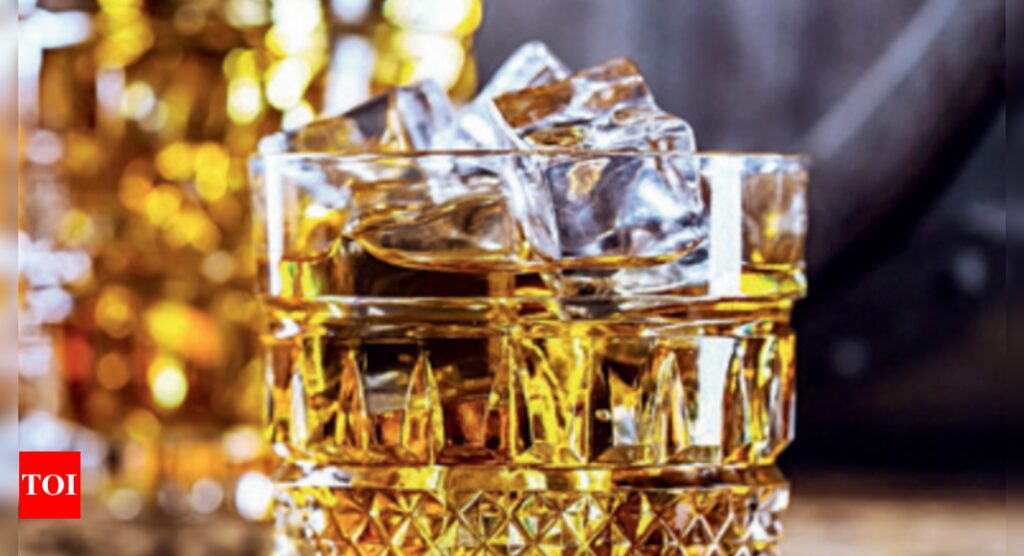[ad_1]
NEW DELHI: In a bid to clamp down on under-invoicing of alcohol, the government is discussing a plan to put in place valuation rules that will require importers to pay customs duty based on a price fixed by customs authorities, which will be the reference price.
The move comes at a time when global giant Pernod Ricard is facing a tax demand of $244 million (around Rs 2,000 crore) for allegedly “under-invoicing” concentrate imports for several years. In the past, other players such as Diageo have been accused of undertaking similar practices to sell to their Indian arms, despite rules in place for transfer pricing and related party transactions.
The issue came up for internal discussions at a time when a free trade agreement (FTA) with the UK is being negotiated and the Rishi Sunak regime is seeking lower tariffs for imported Scotch. The Indian authorities are negotiating tariff cuts with an aim to ensure that the under Rs 750 a bottle segment is not impacted by the move.
The suggestion for a minimum import price was made by the domestic industry and Confederation of Indian Alcoholic Beverage Companies (CIABC), which have pointed out that some of the brands had quoted one-third the price (cost, insurance and freight) to Indian excise authorities compared to the price they had offered to duty-free outlets. This has resulted in consumer prices for some of the brands in India being lower than even the UK. The lobby group has argued that FTAs and under-invoicing could have an adverse impact on domestic players.
So far, discussions have focused on prescribing a value for bottled whisky, with the government yet to take a view on bulk. One option was to get the Directorate General of Foreign Trade to fix a minimum import price (MIP), but this would have resulted in only goods above the fixed price being allowed to enter India.
Instead, the plan is to get DG Valuations in the Central Board of Indirect Taxes and Customs to undertake a valuation exercise and prescribe a price. All consignments imported into the country would then have to pay tax based on the value fixed by customs authorities even if they do not agree. Subsequently, the importer can provide a justification for the import price at which it wants to ship the consignment and in case of legitimate reasons, the authorities would allow assigning a lower value, a source explained.
For years, foreign players have been lobbying to get the government to lower duty on imported spirits, which is currently fixed at 150%. There are hopes that just as Australia, FTAs with the UK and the European Union would help lower tariffs, at least for the high-end products.
The move comes at a time when global giant Pernod Ricard is facing a tax demand of $244 million (around Rs 2,000 crore) for allegedly “under-invoicing” concentrate imports for several years. In the past, other players such as Diageo have been accused of undertaking similar practices to sell to their Indian arms, despite rules in place for transfer pricing and related party transactions.
The issue came up for internal discussions at a time when a free trade agreement (FTA) with the UK is being negotiated and the Rishi Sunak regime is seeking lower tariffs for imported Scotch. The Indian authorities are negotiating tariff cuts with an aim to ensure that the under Rs 750 a bottle segment is not impacted by the move.
The suggestion for a minimum import price was made by the domestic industry and Confederation of Indian Alcoholic Beverage Companies (CIABC), which have pointed out that some of the brands had quoted one-third the price (cost, insurance and freight) to Indian excise authorities compared to the price they had offered to duty-free outlets. This has resulted in consumer prices for some of the brands in India being lower than even the UK. The lobby group has argued that FTAs and under-invoicing could have an adverse impact on domestic players.
So far, discussions have focused on prescribing a value for bottled whisky, with the government yet to take a view on bulk. One option was to get the Directorate General of Foreign Trade to fix a minimum import price (MIP), but this would have resulted in only goods above the fixed price being allowed to enter India.
Instead, the plan is to get DG Valuations in the Central Board of Indirect Taxes and Customs to undertake a valuation exercise and prescribe a price. All consignments imported into the country would then have to pay tax based on the value fixed by customs authorities even if they do not agree. Subsequently, the importer can provide a justification for the import price at which it wants to ship the consignment and in case of legitimate reasons, the authorities would allow assigning a lower value, a source explained.
For years, foreign players have been lobbying to get the government to lower duty on imported spirits, which is currently fixed at 150%. There are hopes that just as Australia, FTAs with the UK and the European Union would help lower tariffs, at least for the high-end products.
[ad_2]
Source link











More Stories
India’S Growth Forecast: S&P ups India’s FY’24 growth forecast to 6.4% on robust domestic momentum
India to remain fastest-growing major economy, but demand uneven: Poll
Jack Ma: Jack Ma gets back into business with ‘Ma’s Kitchen Food’